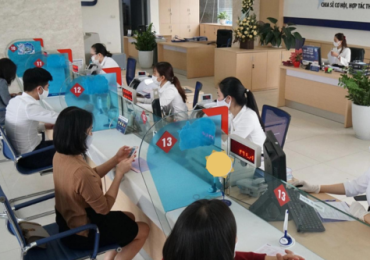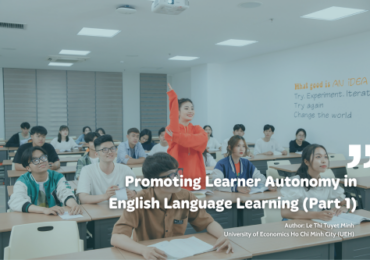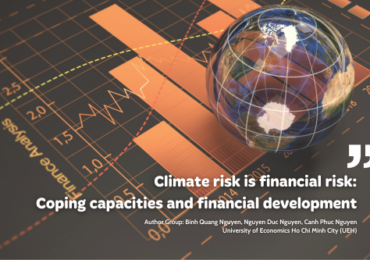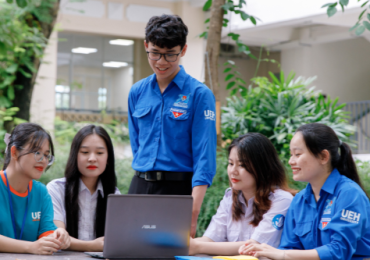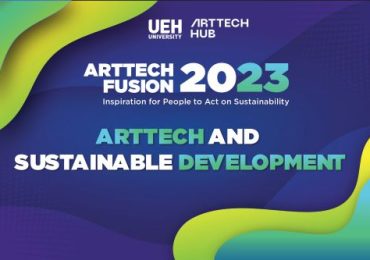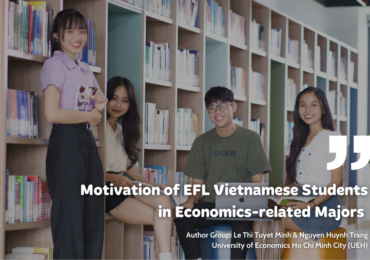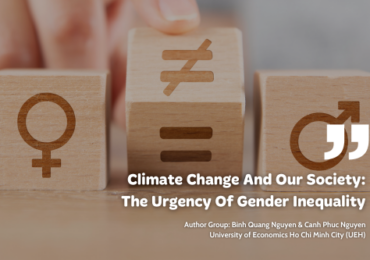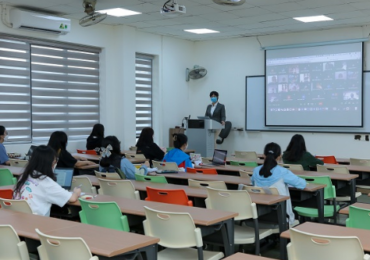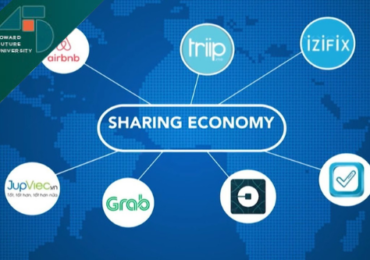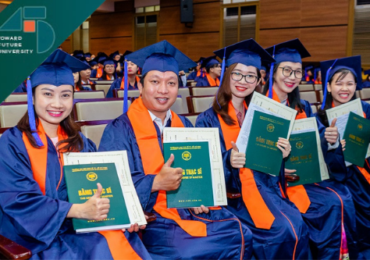[Research Contribution] 10 Global Career Trends Shaping the 5.0 Era – Part 2
7 July, 2025
In the context of the 4.0 era that is changing strongly and gradually entering the 5.0 era, choosing a career is no longer simply about the goal of “what to do to get a high position and good salary”. Instead, a bigger question is raised: how to develop sustainably and adapt flexibly in an ever-changing labor market. In part 2 of the Live Talk “10 global career trends shaping the 5.0 era – part 1”, experts will answer common concerns in career orientation, while providing a new and practical perspective for parents, students and learners.

Live Talk 02 features leading experts with rich experience in the fields of education and technology: Prof. Dr. Nguyen Khac Quoc Bao – Vice President of University of Economics Ho Chi Minh City, Mr. Lam Nguyen Hai Long – Chairman of Ho Chi Minh City Information Technology Association, and MC Tuyen Tang.
04 groups of current career trends
MC Tuyen Tang: Prof. Dr. Nguyen Khac Quoc Bao, in the context of the world approaching the era of super intelligence 5.0, how “sensitive” do we need to be? What are the career trends that are likely to explode, are gradually shifting or will even become constant, regardless of the changes of the times?
Prof. Dr. Nguyen Khac Quoc Bao: This is a very valid question, and in fact, it is also the issue that we always put first in the process of designing, updating and restructuring the training program at University of Economics Ho Chi Minh City – UEH. Because after all, university education is to train high-quality human resources to effectively, flexibly and adaptably meet the needs of society.
From the perspective of an educator and economic researcher, I see that there are currently 4 groups of career trends that are and will continue to develop strongly:
The first is the group of occupations formed from the explosion of technology. These occupations are both the inevitable result of the technological development process and also contribute to further technological development. We are talking about fields such as Artificial Intelligence (AI), Metaverse, Blockchain, and Big Data, which require high expertise, creative thinking and the ability to quickly adapt to technology. This will be the group of occupations that play a pivotal role in the super-intelligent era 5.0 that we are heading towards.
The second is the group of occupations that use technology to restructure and renew traditional fields. A typical example is the finance and banking industry: previously operating according to the traditional model, now it is gradually transforming strongly through the application of technology to activities such as transactions, investments, asset management, etc. Technology helps shorten time, optimize efficiency and increase accessibility. The combination of finance and technology has formed the FinTech industry. Similarly, when technology is integrated into Logistics, we have LogTech. And in education, this combination creates ArtTech – the field that UEH has early deployed training.
The third group of occupations used to be freelance, but thanks to the support of technology, have gradually formed clear and widely recognized career paths. For example, remote work, freelancer, independent accounting service, or game streamer – are the fields that are growing very strongly, thanks to technology platforms and modern support tools such as artificial intelligence. People working in these fields can completely maintain high performance, ensure quality, without having to be physically present at a fixed office.
Fourth, and also the group that I believe will have a far-reaching impact on the entire society, is the group of industries related to sustainable development and green development. Today, the value of a business is not only measured by revenue or profit, but also by the level of social responsibility, sustainability in operations, and positive impact on the ecosystem. Professions such as environmental analysts, renewable energy managers, sustainable development consultants, carbon policy managers, etc. will be key positions in the economy of the near future.
All of the trends I’ve shared are not just predictions. Educators are making these trends a reality by designing, developing, and implementing training programs that precisely meet the new demands of today’s and tomorrow’s economy.
Choosing a career: High position, good salary or suitable for yourself?
MC Tuyen Tang: Tuyen believes that whenever it comes to choosing a major or a future career, at any point in time, we will face concerns – perhaps concerns that have become “classic”. For example: “Which major should I choose to have a high position?”, “Should I work in the public or private sector?” These questions are not only of concern to students but also to parents, because these are important choices that can deeply affect the future of their children. So, I wonder how Prof. Bao views these concerns?
Prof. Dr. Nguyen Khac Quoc Bao: Over the years, during the admissions consulting process, I have heard many times the same highly practical questions: “Will I earn a lot of money studying major A or B?”, “Will I have the opportunity to stay in the city to work and study further?”, “Is it easy to advance in this major?”, “Will that major give me the opportunity to travel to many places and gain experience?”
These questions clearly demonstrate the legitimate aspirations of young people who want to develop themselves, get rich honestly, and find a stable and far-reaching career. They are very practical and necessary.
So what is my advice? That is to do your current job well. If you want to develop, to succeed, or to advance, first of all you have to do well and do it right. Therefore, the first and most important thing on your career journey is to choose the right field, the right profession and the right place to study.
A prestigious, systematic, and reputable learning environment not only teaches you professional knowledge, but also opens up a space for experience through extracurricular activities, clubs, and international joint programs, which create comprehensive development, both in terms of capacity and soft skills. That is the foundation for you to study further, become a leader, or even succeed on a global scale. So, don’t worry about titles, salaries, or opportunities to go abroad because if you go in the right direction and are properly trained, those things will come.
Modern universities need to move towards a multidisciplinary training model.
MC Tuyen Tang: In the context of the strong transformation of the 4.0 era, especially when new technologies such as AI, Blockchain, big data, etc. continuously appear, what does university education need to equip students with to effectively adapt to the new era?
Prof. Dr. Nguyen Khac Quoc Bao: There are two folk proverbs that are often repeated in career orientation programs that I have participated in. The first one is: “The career chooses the person, the person cannot choose the career” – an outdated concept that is no longer suitable in the present era. The second one is the same: “One job is mastered, one life is glorious” – although it was very true in the old context, when the list of careers was simple and fixed.
Nowadays, with the explosive development of technology and high interdisciplinary nature, the boundaries between careers have been blurred. Possessing a deep specialized skill is a necessary condition, but not enough. Modern workers must be able to integrate and connect knowledge from many different fields to create outstanding capacity.
For example, a person working in finance not only needs to understand investment, valuation or market analysis, but also needs to master technology tools such as AI, Big Data, programming techniques, etc. to make accurate and timely decisions in a real-time operating context. Similarly, an artist no longer only works with brushes and oil paints, but today can create on digital platforms, bring art products to the metaverse, trade on blockchain platforms, etc.
Therefore, modern university education needs to move towards a multidisciplinary training model, where learners develop their knowledge in breadth and depth, have the ability to work flexibly in many environments, various career fields, and especially adapt quickly to the constant fluctuations of the labor market.
Public or Private: Criteria for choosing a working environment that suits your abilities and personal goals
MC Tuyen Tang: And now, we would like to return to one of the common concerns, which can be called “old-fashioned”, that students or university students preparing to enter the career threshold often ask: should they choose to work in the public sector – the State, or join the private sector – private enterprises?
In this content, we would like to listen to the professional perspective from Mr. Lam Nguyen Hai Long.
Mr. Lam Nguyen Hai Long: I am fortunate to have the opportunity to work in both the public sector (also known as the State sector) and the private sector. This experience has given me an overview, as well as an understanding of the specific differences between the two organizational systems.
If we go back a few decades, when our generation first graduated from school, we can see that at that time the economy was still quite small, the job market was not yet developed, and there were not many opportunities in the private sector, so most young people often turned to the public sector with the expectation of long-term stability, strict discipline and little change. Meanwhile, the private sector was often associated with stereotypes such as high pressure, fierce competition, and sometimes even unfair treatment. That was a reality in the past.
Today, however, the landscape is very different. Both the public and private sectors are being heavily influenced by digital technology, especially by the wave of national digital transformation. We are witnessing remarkable changes in the public sector – many agencies and departments have begun to require specialists to apply AI technology in their clerical work, planning management, and even in their daily work processes. This shows that the gap – or in other words, the “line” – between the public and private sectors is blurring.
So, instead of asking the question “Is working in the public sector better than the private sector?”, I think we should re-ask the question: Which working environment will best suit our abilities, goals and personal development orientation?
From personal experience, I would like to suggest some specific criteria for young people to consider:
(1) Recognized self-worth: Any environment that helps you create value, and that value is properly recognized, is an environment worth choosing.
(2) Development opportunities: Choose a place that creates conditions for you to learn every day, hone your skills, develop your capacity and continuously expand your thinking.
(3) Suitable for personal orientation: If you have the goal of becoming a leader, or want to advance quickly, then choose an environment that can help you realize that goal. The important thing is to be the right person – right place – right direction.
In short, I would like to summarize it in three factors: Creating value – Developing yourself – Matching goals. If the workplace has all three of these factors, regardless of whether it is public or private – it is an ideal environment for young people to start and develop their careers.
In addition, to be able to adapt and perform well in any environment, I think young people also need some preparations:
- First, you need to practice a positive and professional working attitude. This is the first criterion that any employer highly appreciates.
- Second, in the digital age, you must equip yourself with digital skills – mastering tools, applications, and support software to improve work performance.
- Third, you should cultivate a spirit of lifelong learning . No one can develop sustainably if they stop learning.
- Fourth, you need to adapt quickly to change – because today’s work environment is constantly moving, requiring high flexibility.
- Finally, you have to practice critical thinking to improve the ability to analyze and evaluate problems, thus improving thinking and decision-making capacity.
These are some things that I have learned from my work process, and would like to share them with you as a reference for your upcoming career journey.
Orientation of comprehensive human resource training to meet public-private requirements in the digital economy
MC Tuyen Tang: So from the perspective of an educator, someone who directly designs human resource training programs for the future, how do you evaluate the movement between public and private in the current university training system?
Prof. Dr. Nguyen Khac Quoc Bao: First of all, I would like to express my deep sympathy for Mr. Long’s very practical and dedicated sharing. It can be said that between those who work in practice – those who directly feel and handle the problems of the labor market and those who work in the education sector like us – those who are building and adjusting training programs – there is a very clear harmony and resonance.
I particularly appreciate Mr. Long’s comment that the boundary between the public and private sectors is increasingly blurring, and in my opinion, this is not just a temporary trend, but will become an inevitable movement of the labor market in the era of digitalization and deep integration. Except for a few highly specific fields such as defense, security or armed forces, which inherently have separate organizational structures, most other fields are moving towards convergence between the public and private sectors .
Based on that awareness, at University of Economics Ho Chi Minh City – UEH, we do not aim to train students to work only in the public or private sector, but we aim for a higher goal: to train comprehensive citizens of the knowledge economy – people with real learning, real talent, solid professional capacity, social responsibility, lifelong learning spirit and above all, the ability to adapt in any environment – whether public or private.
Therefore, in the process of designing the training program, we pay special attention to the fundamental modules on digital thinking, data analysis, innovation and process improvement. An individual who wants to work effectively in the digital age cannot only “understand the law to do the right thing” but also “understand data to live in the digital environment”. Similarly, it is impossible to stop at “doing the right process” but must aim at “optimizing and improving the process” to enhance user experience, save resources and increase operational efficiency for both areas.
It is the sharing from Mr. Long – representing the voice of businesses and market realities – that makes us feel more confident that the current educational and training orientation of the school is on the right track. We expect that, from this foundation, the human resources trained by UEH will meet the requirements of both the public and private sectors, and more broadly, meet the expectations of a Vietnamese economy that is transforming strongly to enter a new era of development – the era of the Vietnamese people’s rise.
This article is part of the series spreading research and applied knowledge from UEH with the message “Research Contribution For All – Research for the Community”. UEH cordially invites readers to the next UEH Research Insights newsletter.
___________________________
The Sustainable Career Orientation 5.0 Live Talk Series “Empowering Tomorrow” organized by University of Economics Ho Chi Minh City – UEH, broadcast on UEH and VnExpress is a project that accompanies parents and students through connecting 3 aspects in the career selection journey of the young generation: (1) Understanding personal career inclinations; (2) Understanding future trends in the 5.0 era; (3) Understanding educational trends of the 5.0 world. With the 3 “Understandings”, students will be able to choose the right major and be “satisfied with their choice”.
News and photos: UEH Department of Communications and Partnerships

[Podcast] Recommendations for University education development
14 February, 2025
[Podcast] Developing Vung Tau into a World-Class Tourism City
16 January, 2025
[Podcast] Postdigital Design Strategies for Media Art
6 January, 2025
[Podcast] NFTs – Artistic Innovation or Just a New Hype?
27 December, 2024
[Podcast] Boosting Employee Creativity with Constructive Feedback
23 November, 2024
[Podcast] “Dutch Disease” in Remittances and the Case of Vietnam
4 November, 2024
[Podcast] Latest approaches for sustainable universities
11 July, 2024
Data Law – Part 1: Necessity for a New Approach
18 May, 2024
Advertising Evaluation on Tiktok Platform
14 May, 2024
[Podcast] Advertising Evaluation on Tiktok Platform
13 May, 2024
Promoting Learner Autonomy in English Language Learning (Part 1)
24 November, 2023
ArtTech And Sustainable Development
27 October, 2023
Motivation of EFL Vietnamese Students in Economics-related Majors
12 October, 2023
Climate Change And Our Society: The Urgency Of Gender Inequality
12 October, 2023
People Analytics in Vietnam
10 March, 2022
Revolution in Experimental Economics
30 January, 2022
The Sharing Economy: Governance Issues in Vietnam
24 January, 2022
Employment Policy For Ho Chi Minh City in Post-social distancing Period
28 December, 2021
Lifelong learning at UEH: Towards a Sustainable University
28 December, 2021
Building a Decentralized Stock Market based on Blockchain Technology
24 December, 2021
Consumer price index from big data mining perspective (Big data)
17 November, 2021
Overview Of Digital Currency – Part 5: DIEM Private Stabilized Currency
11 November, 2021




























































































































































